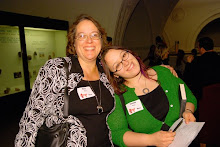There are extensive rules for giving a eulogy, and we touch on them in our article on eulogies, though it's not a comprehensive look at halakhot having to do with a hesped, or a eulogy. I looked through those halakhot before I wrote what I said at my mother's funeral, and was interested to find that we are meant to say things at a eulogy that will "break people's hearts," and make them cry over the loss (Yoreh Deah 344:1). Also, at a eulogy one can exaggerate the accomplishments of the deceased (Rosh on Moed Katan 3:63), though it is a sin to outright lie (Brachot 62a).
These rules only apply to the eulogy itself, but I think about them a lot in terms of how we remember people who have died--how we lionize or demonize them, and how we hone our selective memory so that we come out with a particular understanding of someone who was likely more complex than we imagine.
I struggle a lot with how to deal with unhappy memories of my mother. When I unexpectedly think of one of the really good times--a Friday night in her apartment in Jerusalem, surprising her at home the week after she finished chemo--I get teary, but when I am suddenly ambushed by a memory of a bad time--one of any number of fights we had while I was in high school, or my birthday this year when she said to me, "Don't touch me!"--I think I might just pass out the despair is so great.
I don't know if I'm exaggerating my mother's warmth and love and all of the good things about her that I think about constantly. I don't think so, but I suppose I'm an unreliable source when it comes to these things. I wonder, then, if I'm also unreliable when it comes to the bad things. Were any of them as bad as I thought? If they weren't, as I expect is the case, then I should probably be slapped. Hard.
They say hindsight is 20/20, but it doesn't feel that way. Every memory seems like it should be interrogated--Was the light that warm? Was the hug that sincere and long? Did I really restrain myself from rolling my eyes in that moment?--but I'm not sure where I'm supposed to end up. I want my memories to be of my mother--my real mother, not some idolized version that towers over me, unattainable. But I want it both ways. I'd very much like the bad moments to be packed up in a newfangled Pandora's box, hidden in the back of my closet, never to be seen again.
(Cross-posted at Mixed Multitudes)





